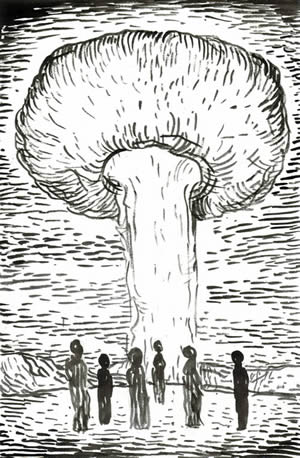back to preview page

"Oppenheimer's Angels" by William T. Ayton, 2008
Gregory's Last Lines
He was a poet of silk and the shredding of silk.
No earthling nor deity remained immune from his probing questions.
When the academy turned its head for a pulitzer second
he slipped an enlightened humor worm into the gut of poetry
that hasn't yet wriggled its way out.
With fountain pen tears he mourned the nationalism of the nation
even as he hosannahed the home run.
He fooled death, coaxing it into the soup of life
every time but for one.
Writing in “Many Have Fallen” about American soldiers
marched by Army into radioactive bomb blasts
Gregory wrote: “All survived / ...until two decades later
when the dead finally died”--
a last line of stunning poetry enough to make the top
of Emily D's head pop off.
In 1983, Andy Clausen brought him to carouse
our New Brunswick bars.
We stopped first at my kitchen table electric typewriter,
where Gregory pulled his pocket notebook
and tapped out a piece for Long Shot magazine.
The poem was called “Delacroix Mural at St. Suplice.”
Deep into typing, Gregory stopped & asked
what thought I of his last three pencil'd lines.
I eyed his notebook, said I liked 'em but not as much
as the rest of the poem.
I thought he might write three new ones on the spot--
but instead he stood up, waved his left hand suavely
& declared the poem done at what'd been
the fourth-to-last line:
“I know the ways of god / by god!”.
He knew how to end / at the ending.
I had the chance to read him “Ode to the West Wind”
on his cancer bed:
“If Winter comes, can Spring be far behind?”
After approaching mortality's last breath in summer,
he arose to see another new year.
Now, I hear his ashes will be buried in Rome's cemetery,
a neighbor of Shelley & the one whose name is writ in water.
In “Getting to the Poem,” Gregory ended:
“I will live / and never know my death.”
Who can say whether he was aware of that golden moment
when the breath says “no”?--
but he damn sure got to the poems.
Death, Gregory knew your secret name,
he knew your habits, your weapons, your games--
now give his verse the life it deserves
& do what you will with his gilgamesh hair
Eliot Katz 1/01
|